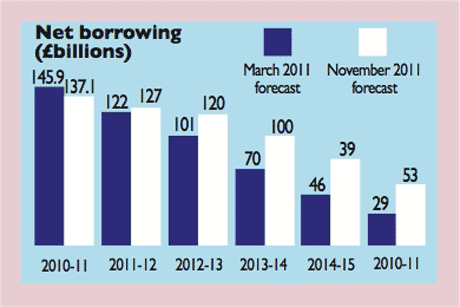Get the latest financial news, insights and expert analysis from our award-winning MoneyWeek team, to help you understand what really matters when it comes to your finances.
You are now subscribed
Your newsletter sign-up was successful
Want to add more newsletters?

Twice daily
MoneyWeek
Get the latest financial news, insights and expert analysis from our award-winning MoneyWeek team, to help you understand what really matters when it comes to your finances.

Four times a week
Look After My Bills
Sign up to our free money-saving newsletter, filled with the latest news and expert advice to help you find the best tips and deals for managing your bills. Start saving today!
Get set for "more cuts, more pain, more borrowing", said The Independent. Chancellor George Osborne's autumn statement was unrelentingly bleak. He had hoped to eliminate the structural budget deficit by 2014/2015, as projected in the March budget. But he will now need a further two years of austerity to reach his target. Public-sector job losses are expected to reach 710,000, up from an initial forecast of 400,000. Britain will have to borrow £111bn, or 7% of GDP, more than expected over the next five years, and public debt is set to peak at 78% of GDP, not 70.5%.
This reflects much weaker growth over the next few years. The Office for Budget Responsibility (OBR) almost halved its growth forecast for this year to 0.9% and cut its estimate for 2012 from 2.5% to 0.7%. All told, the economy will be 3.5% smaller in 2016 than the OBR previously thought, and not much bigger than in 2007.
What the commentators said
Osborne found some money to spend on infrastructure by making further cuts to current spending, such as public-sector pay. But we're only talking about £4bn over the next three years, around a third of 1% of GDP, said Roger Bootle in The Daily Telegraph. There were various other well-trailed initiatives, including the plan to help small businesses access loans. This just reflected the "gimmicks characteristic of all governments under stress", said Martin Wolf in the FT. It all almost added up to "Gordon Brown's levels of initiativitis'. Yet the ideas are fairly small beer." The big picture is that "the UK is set for a lost decade".
MoneyWeek
Subscribe to MoneyWeek today and get your first six magazine issues absolutely FREE

Sign up to Money Morning
Don't miss the latest investment and personal finances news, market analysis, plus money-saving tips with our free twice-daily newsletter
Don't miss the latest investment and personal finances news, market analysis, plus money-saving tips with our free twice-daily newsletter
So why is growth so poor? Largely because high inflation has made people feel poorer, denting consumption. But there's another problem. The OBR's estimate of spare capacity is now lower, meaning that the economy's growth potential, or speed limit the amount it can grow without sparking inflation is also lower. "This all sounds gloomy enough," said Patrick Hosking in The Times. But "it is based on the premise that the eurozone crisis is tackled in an orderly manner". Ructions from a European meltdown would make the outlook "dramatically worse".

Even without a euro meltdown, the OBR is still being "ridiculously over-optimistic", said Allister Heath in City AM. It expects growth of 2.7% in 2014 and 3% in 2015. "Forget it." There's "far too much private-sector deleveraging to do and the economy is too tied up in red tape and incentive-destroying taxes".
So the debt targets could well slip, endangering our credit rating and heralding yet more austerity and misery. We enjoyed the longest uninterrupted boom in history up to 2007, said Jeremy Warner in The Daily Telegraph. "Boy, are we now being made to pay for it."
Get the latest financial news, insights and expert analysis from our award-winning MoneyWeek team, to help you understand what really matters when it comes to your finances.
MoneyWeek is written by a team of experienced and award-winning journalists, plus expert columnists. As well as daily digital news and features, MoneyWeek also publishes a weekly magazine, covering investing and personal finance. From share tips, pensions, gold to practical investment tips - we provide a round-up to help you make money and keep it.
-
 Should you buy an active ETF?
Should you buy an active ETF?ETFs are often mischaracterised as passive products, but they can be a convenient way to add active management to your portfolio
-
 Power up your pension before 5 April – easy ways to save before the tax year end
Power up your pension before 5 April – easy ways to save before the tax year endWith the end of the tax year looming, pension savers currently have a window to review and maximise what’s going into their retirement funds – we look at how

